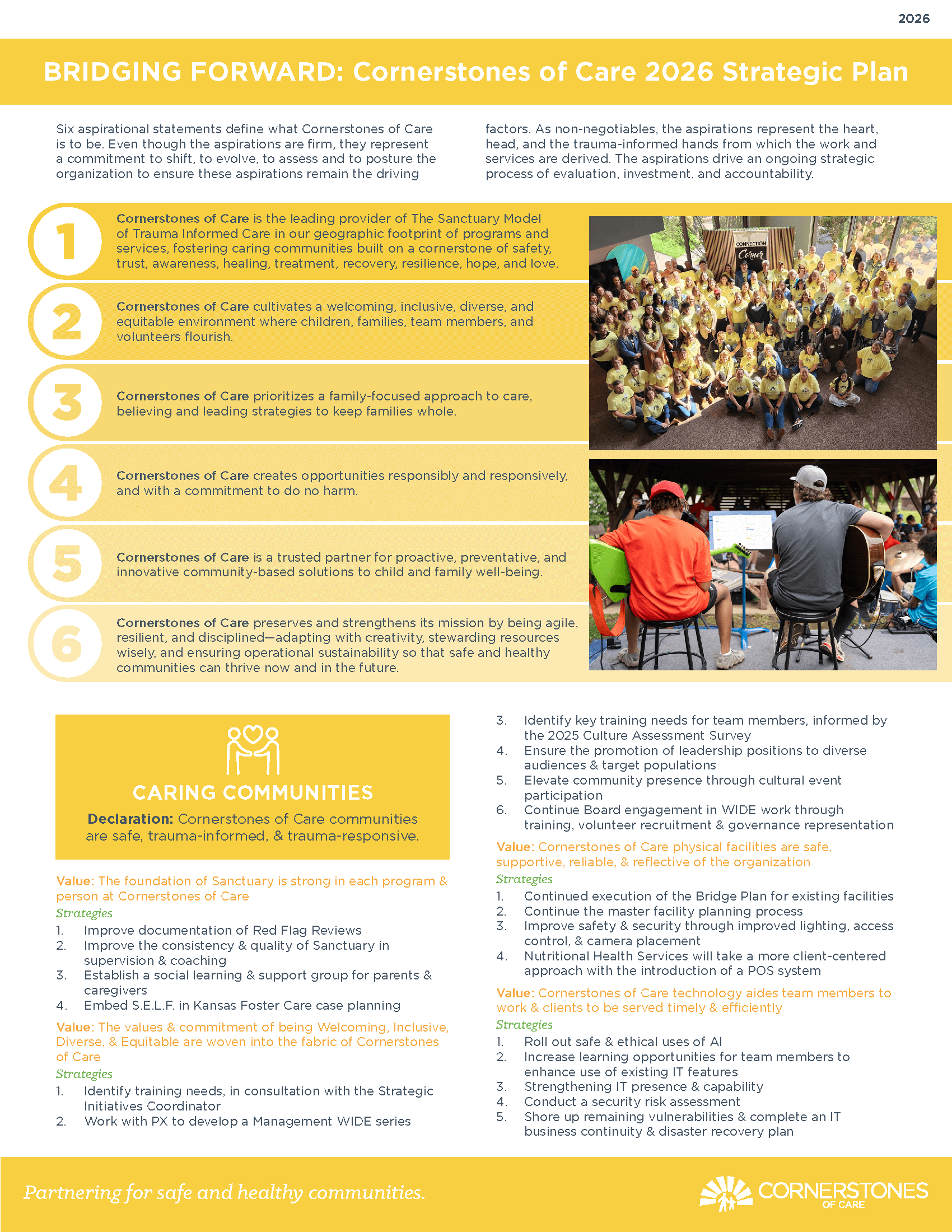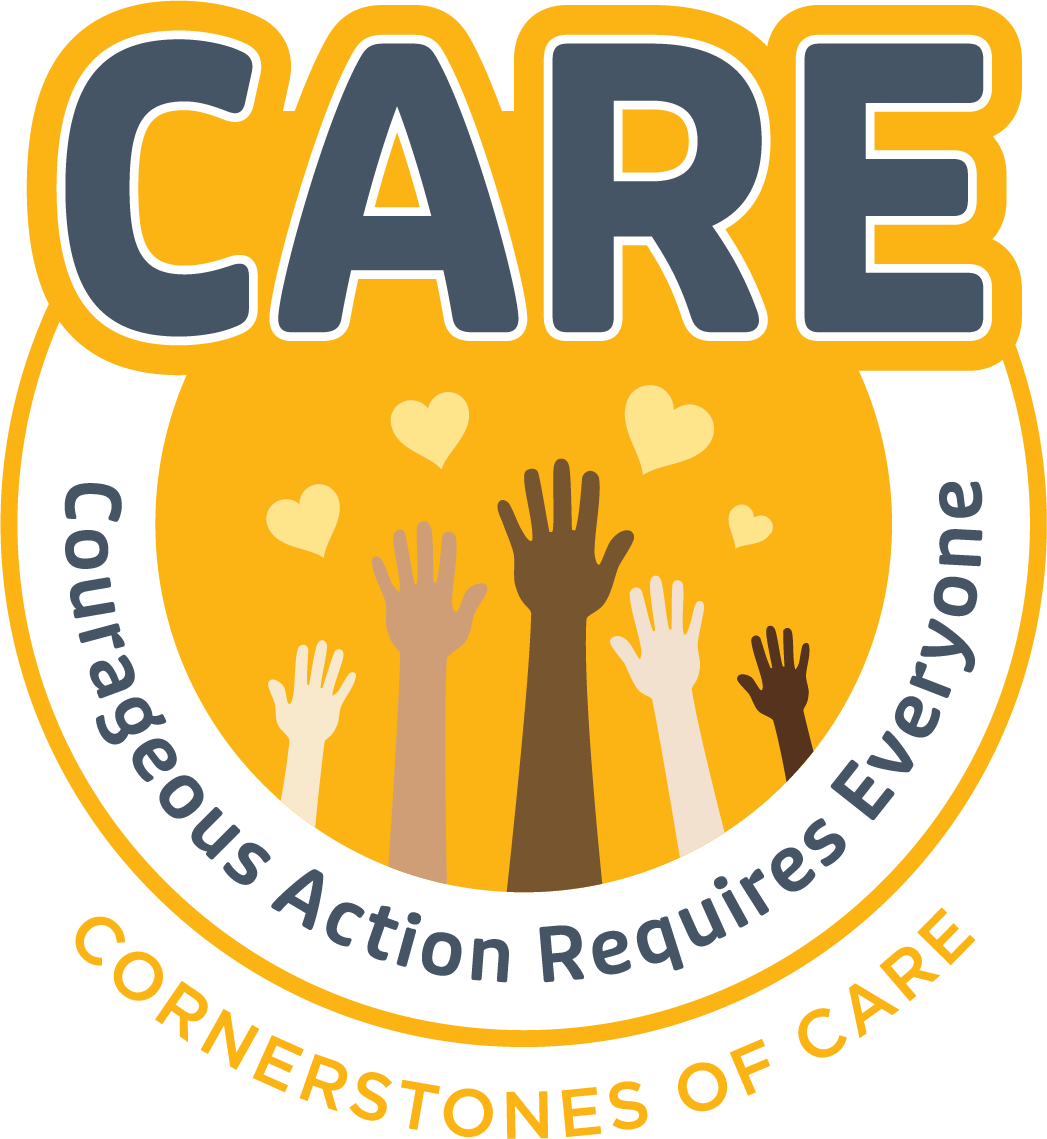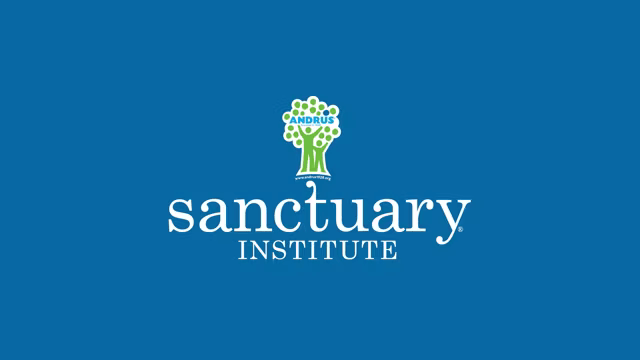The Cornerstones of Care mission statement is the heart of our organization. It serves as a testament to our rich history, resonates in our day-to-day endeavors, and propels us toward a future brimming with possibilities. Guided by this mission, we continuously innovate and implement transformative programs that enhance the lives of over 15,000 children and families annually in Kansas, Missouri, and beyond.
OUR MISSION
Partnering for Safe and Healthy Communities
OUR BELIEF
We believe that children thrive within families, and families flourish within caring communities. Every day, our dedicated team collaborates with countless children and families, empowering them with comprehensive prevention, treatment, and support services. Through this collective effort, we foster healing and cultivate resilience, paving the way for a brighter future. When you work with us, you play an integral role in the positive transformation of thousands of lives, safeguarding the well-being of children, strengthening families, and nurturing vibrant communities.
OUR STRATEGIC PLAN

Statements of Aspiration
- Cornerstones of Care is the leading provider of The Sanctuary Model of Trauma-Informed Care in our geographic footprint of programs and services, fostering caring communities built on a cornerstone of safety, trust, awareness, healing, treatment, recovery, resilience, hope, and love.
- Cornerstones of Care cultivates a welcoming, inclusive, diverse, and equitable environment where children, families, team members, and volunteers flourish.
- Cornerstones of Care prioritizes a family-focused approach to care, believing and leading strategies to keep families whole.
- Cornerstones of Care creates opportunities responsibly and responsively, and with a commitment to do no harm.
- Cornerstones of Care is a trusted partner for proactive, preventative, and innovative community-based solutions to child and family well-being.
OUR TREATMENT PHILOSOPHY
We are dedicated to helping children and families wherever they are, whenever they need us. Our prevention, treatment, and support services are an integration of traditional social welfare and innovative behavioral healthcare services. Each year, we positively impact 7,000 children and families, plus an additional 4,000 community members. Through our efforts, we nurture improved health, enhanced happiness, fortified confidence, honed competence, and foster self-sufficiency, thus fostering a brighter future for all those we serve.



Trauma-Informed Care
We are committed to comprehending, acknowledging, and addressing the profound impact of trauma. Guided by the philosophy of trauma-informed care, we believe that healing and recovery from extreme stress and adversity requires a nurturing environment for all. Equipped with an array of invaluable tools and resources, our compassionate team collaborates with children and families to develop skills and knowledge that will empower them to live safe, productive, and non-violent lives, both within and beyond our organization’s embrace.
WIDE Initiative
After recognizing a critical role to play in addressing historic inequities within the child welfare sector, Cornerstones of Care launched its welcoming, inclusive, diverse, and equitable, or WIDE, Initiative in early 2020 as part of our 2020-2023 Strategic Plan. Over the two years since, the agency has undertaken a series of intentional efforts to demonstrate our commitment as a WIDE organization. This includes executing board-level involvement in WIDE initiatives; collecting data to understand disparities in experience and outcomes for team members and clients related to diversity and inclusion; and analyzing existing internal policies, procedures, and partnerships through a WIDE lens.
As a result, WIDE became the highest-level imperative in our strategic plan. To date, work has included increased diversification of our board of directors (34% now comprised of people of color, up from 8%); intentional application of our WIDE lens in the recent President & CEO search process; the development and distribution of an organizational commitment to diversity; the implementation of voluntary small group “Sanctuary Conversations” to collect data on awareness among staff of implicit bias and white privilege; a revised employee performance appraisal tool that includes a commitment to WIDE in performance factors; a revised annual client survey to discern the experiences of our clients related to matters of diversity, equity, and inclusion; and an increase in purchases with Disadvantaged Businesses (DBEs) by more than 400%. In December 2022, Cornerstones of Care was awarded a Special Initiatives grant from the Health Forward Foundation to hire an outside consultant, Lexicon Strategies, to take the agency into the next phase of our WIDE journey in 2023 by implementing and operationalizing further efforts identified in our initial work.
A WIDE Vision
At Cornerstones of Care, we commit to fostering a community where every individual, regardless of background or identity, feels deeply welcomed, valued, and empowered. We envision a diverse community where inclusion and welcoming are prioritized. A community where all voices are heard, listened to, and respected. A community where everyones physical, emotional, social, and psychological needs are met. At Cornerstones of Care, we have a vision where equity is not just a goal, but is present in all we do; every team member feels empowered to authentically contribute to their fullest potential. We hold a collective commitment to welcoming, inclusion, diversity, and equity that will drive us forward as a stronger organization.
Sanctuary Model
Our organization is certified in the Sanctuary Model of trauma-informed care, an evidence-based model that considers the impact of childhood trauma in all facets of treatment. Cornerstones of Care was one of the first organizations in the region to implement the Sanctuary Model of trauma-informed care.
To that end, Cornerstones of Care utilizes trauma-informed and trauma-sensitive therapeutic and support services such as Functional Family Therapy, Trauma-Focused Cognitive Behavioral Therapy, Dialectical Behavioral Therapy, and Motivational Interviewing. We also provide supportive services using Signs of Safety, a best practice model used and recommended by the Missouri Children’s Division, and Solution-Based Casework, an evidence-informed practice model.
Solution-Based Casework®
We understand that a child’s ability to thrive hinges upon the safety and stability of their family environment. That’s why several of our programs utilize Solution-Based Casework® (SBC), an evidence-based preventative model specifically designed to reduce lengths of stay for youth in residential treatment and diminish the likelihood of children returning to state custody by increasing domestic permanency. Through our pioneering efforts, we strive to create a brighter future for children and families, ensuring their well-being and fostering stable, nurturing homes.
PREVENTION, TREATMENT & SUPPORT SERVICES
OUR DIVERSITY STATEMENT
We believe in the creation of inclusive communities where children, families, and team members thrive in an environment characterized by safety, respect, and the freedom to authentically express their unique identities – a place where each individual experiences a profound sense of belonging. To ensure that this vision becomes a reality, we have engaged with our team members, clients, stakeholders, and volunteers to craft a diversity statement that defines our commitment to foster diversity, inclusion, and equality throughout all aspects of our organization.
- We partner for safe and healthy communities.
- We cultivate a culture in which children, families, team members, volunteers, donors, and community partners feel welcomed, safe, respected, empowered, and celebrated.
- We value diversity of race, religion, color, age, sex, national origin or citizenship status, sexual orientation, gender identity and expression, geographical location, pregnancy, disability, neurodiversity, socio-economic, and military status.
- We stand for anti-racism, equity, and inclusivity.
- We insist and affirm that discrimination and violence have no place in safe and healthy communities, including in our organization.
- We strive toward a more welcoming, inclusive, diverse, and equitable organization through our policies, partnerships, and practices.


